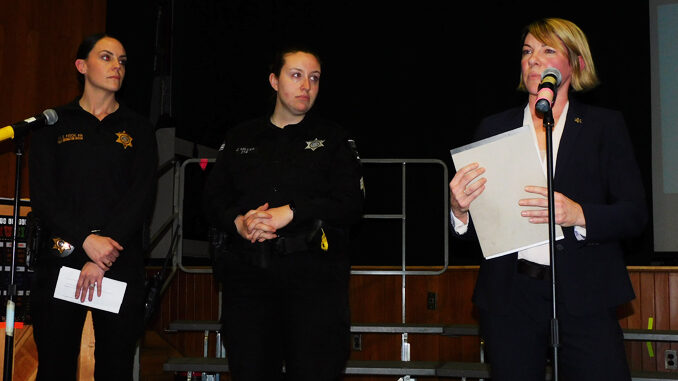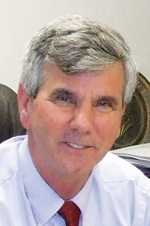
Cornwall’s Community Coalition issues a call to action
Last week, the Cornwall Central School District sponsored a Community Coalition Night, an evening of education and a call to action to help prevent substance abuse in the community.
The presentation included speakers from the county, local, and district levels.
Upon entering the middle school auditorium, guests were asked to consider one word to help keep the community’s youth safe from substance abuse. The top responses included: education, community, communication, awareness, resources, mentors, and at least one person suggested hamburgers.
Meredith McGovern, chief of police for the Orange County Sheriff’s Office, reported there were 654 overdoses in Orange County last year. Of those, 118 were fatal. Three overdoses were attributed to individuals less than three years of age, 41 to teenagers, and 123 to adults ages 20 to 29 years old.
As a lifelong resident of Cornwall and 16-year member of the Cornwall Police Department, Chief Joseph Gebert spoke about the trends he’s seen over the past two decades. He said the opioid epidemic hit Cornwall, like it did elsewhere, but as of late he hasn’t seen as many opioid related drug problems. Based on calls to the department and not any hard statistics, alcohol abuse use has decreased as well. He did say a lot of young adults are being caught with legal marijuana obtained from other states.
Michael Bigg, chief operations officer for New Windsor and Cornwall EMS, reported of the 4,500 emergencies between the two towns last year, 253 were drug related resulting in 13 cardiac arrests and 11 of those in death. Nine of the deaths involved individuals who were 28-years-old or younger.
Joseph DeBold, the district’s director of guidance, said a recent survey was conducted and 604 of the 1,027 high school students participated. The students were asked what grade they think kids will try alcohol, nicotine, or marijuana. The top four answers were ninth, eighth, tenth, and seventh grades. The reasons for trying drugs and alcohol are anxiety, to fit in with peers, and the perception that it offers freedom.
The same students polled said they understand the use of nicotine and alcohol is bad for them, but at the same time easy to obtain from friends, older family members, or gas stations/convenience stores. When asked the same question, the students were less sure of the dangers of marijuana because of its legality and ability to be easily obtained.
Having researched early adolescent development, middle school principal Kate Polumbo offered some insight into the development of the teenage brain and why students are making the choices they do. She said middle and high school students are governed by a fight or flight response, the emotional part of their brain that makes them do crazy and irrational things.
“Adults have a fully developed frontal lobe which prevents us from doing the things our children are doing,” she said. “Our children don’t have the ability to do that. Their brain has not developed. It has nothing to do with how smart they are. Students want to fit in and try different ways to fit in. They may make a choice to try an edible or hang out with people whom parents may not be comfortable with. They want to find people who think they’re cool.”
Polumbo said teens have no regard for the consequences that could lead to a habit or death and no impulse control to regulate emotions.
Kathryn Wilhelm, assistant principal at the high school, said there’s been an uptick in discipline referrals related to drugs in the building. She said students are using products with synthetic THC which does not show up in drug tests. They do exhibit side effects such as altered perception, extreme paranoia and anxiety, slurring of speech, mumbling, anger, and they may start to sweat and turn pale. She said students have been carrying around smelling salts to help bring them out of a high.
Jennifer Ocasio, prevention coordinator for the Alcoholism and Drug Abuse Council of Orange County, said today’s marijuana products are different from those used in the 70s to early 2000s.
While edibles from a dispensary may only contain five milligrams of THC, the products students are obtaining from unknown sources contain 100 milligrams in one gummy.
So how does the community respond to a growing problem? The police department recently equipped all vehicles with Narcan. The ambulance corps has Narcan available to community members. A training seminar will take place at 3 p.m. on April 30 at the Cornwall station.
Chief Gebert said there’s a state law in place which prevents the police from arresting anyone for possession of a controlled substance, unless it’s an enormous amount, if someone calls 911 because someone is experiencing a medical emergency related to a controlled substance.
Two years ago, the Marijuana Regulation and Taxation Act was passed in Albany and all 1,500 state communities were required to vote if they wanted a piece of the tax collected on marijuana sales. The town and village voted not to allow dispensaries and on-site consumption facilities.
The town also created the Cornwall Youth Committee, which offers children an opportunity to participate in activities in lieu of screen time in front of their phones or other electronic devices.
The committee sponsors the Color Bash and contributed the snow machine during Winter Fest.
The Gardening Club is getting underway and the hope is to introduce a Hiking Club, as well as a program where older kids can mentor younger ones.
The Alcoholism and Drug Abuse Council of Orange County provides prevention, intervention, and recovery services. No Empty Chair, run by Orange County Stop DWI, promotes safety during prom and graduation season. The statewide campaign will entail different initiatives the week of April 24.
The Town of Highlands Community Coalition will hold a Family Wellness Conference from 8:30 a.m. to 2:30 p.m. on April 22 at the Highland Falls Intermediate School, 52 Mountain Ave. The event is open to all 8th to 12th grade students, parents, and guardians from Orange County. A light breakfast and lunch will be provided. The special guest speaker and co-sponsor is Orange County District Attorney David Hoovler.
DeBold said the district offers mental health and substance abuse interventions for students and push-in programs in the classrooms, as well as recommendations to outside resources. He said the community coalition is only the start of a larger effort to control substance abuse.



